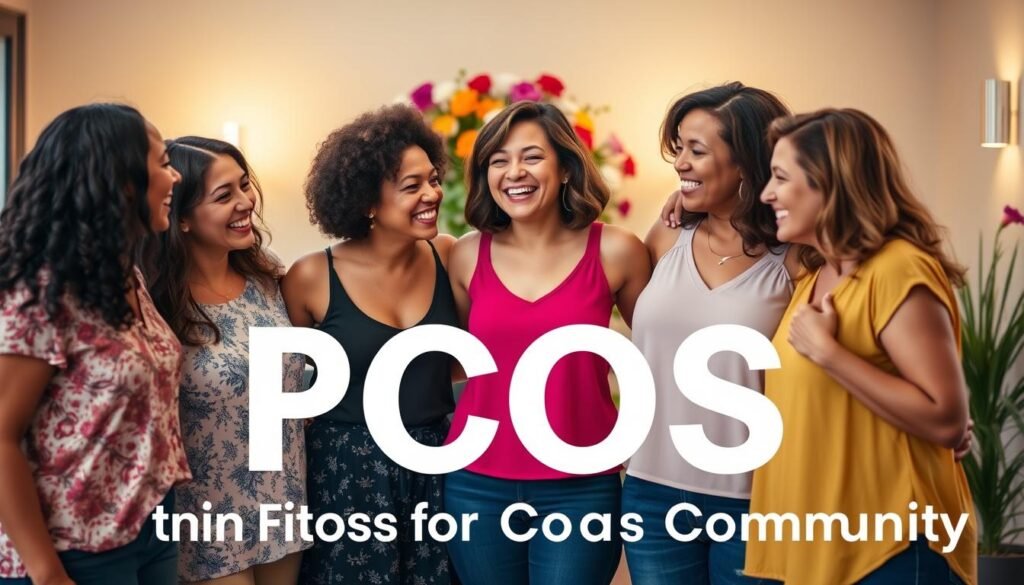About 10 million women in the United States live with Polycystic Ovary Syndrome (PCOS). That’s one in five women facing the most common endocrine disorder in females. Many struggle with physical issues and societal judgment, harming their mental health and overall happiness.
Often, the reality of women with PCOS is ignored or misrepresented. A study of digital magazines aimed at teens and women showed this well. These articles depict PCOS symptoms as hindrances, unfairly tasking women with fixing their health. Worse, Latina and African American women are rarely included, showing a big gap in PCOS awareness and education.
We wrote this piece to share stories from women living with PCOS. Sharing these experiences fosters understanding, empathy, and breaks the silence on the issue. This way, we help women feel seen in their struggle with hormonal imbalances, encouraging mental wellness and community engagement.
Key Takeaways
- PCOS affects around 10 million women in the U.S., highlighting the importance of awareness.
- Sharing personal stories helps women with PCOS feel understood and supported.
- Cultural backgrounds influence the perception and treatment of PCOS symptoms.
- Women with PCOS face significant mental health challenges, including anxiety and depression.
- There is a critical need for inclusive narratives in the media to represent all women with PCOS.
Understanding PCOS: A Brief Overview
Polycystic Ovary Syndrome (PCOS) is a hormonal condition affecting 8–13% of women in their reproductive years. It leads to various health issues and long-term concerns. Sadly, many women with PCOS go undiagnosed, with studies showing up to 70% may not be recognized by doctors.
What is Polycystic Ovary Syndrome?
PCOS brings symptoms like irregular periods, excessive hair, acne, and weight gain. It is a main cause of not ovulating, which can lead to infertility. To diagnose PCOS, doctors look at criteria including polycystic ovaries on ultrasound, irregular periods, and high levels of certain hormones.
Common Symptoms and Challenges Faced by Women
Women with PCOS deal with both physical and emotional challenges. PCOS symptoms go beyond fertility issues, leading to conditions like diabetes, high blood pressure, and heart disease. It also causes mental health struggles such as anxiety, depression, and poor body image due to societal judgments.
Understanding the varied health issues caused by PCOS is key. It helps improve the care and support available to those affected.
The Hidden Mental Health Effects of PCOS
Millions of women worldwide suffer from Polycystic Ovary Syndrome (PCOS). This condition is getting a lot of attention for its impact on mental health. Studies show a strong link between PCOS and mental well-being. Many women with PCOS report feeling more anxious and depressed.
Their mental health struggles often come from dealing with issues like unwanted hair growth and weight changes. These are made worse by societal beauty standards.
The Link Between PCOS and Mental Well-Being
Women with PCOS have a higher risk of experiencing mental health problems. About 64.1% of them face depressive disorders. This is a big challenge for those affected.
They also often deal with chronic tiredness and trouble sleeping. These issues make their daily lives harder. It’s crucial to address these mental health effects correctly to improve their overall health. Learning more through PCOS education programs can be really helpful.
Negative Impacts of Societal Beauty Standards
Society’s beauty ideals can make women with PCOS feel worse about themselves. They often struggle with their self-image. This can lead to bigger mental health problems, like more anxiety and depression.
The pressure to meet these unrealistic body standards can stress them out. This stress is bad for their health. It’s important to support these women by advocating for change and increasing understanding.
| Mental Health Impact | Statistics |
|---|---|
| Women with depressive disorders | 64.1% |
| Higher risk for anxiety | Compared to controls |
| Experiencing chronic fatigue | Common among PCOS patients |
| Impact of societal beauty standards | Significant on self-image |
Breaking the Silence: Sharing Personal Stories
Women with polycystic ovary syndrome (PCOS) face more than physical issues. Telling their stories creates understanding and empathy. By sharing, they help build a supportive community.
The Power of Personal Narratives in Building Community
Sharing stories has a big impact on women with PCOS. It starts conversations and helps fight stigma around reproductive health. These stories create a space where women feel recognized and supported.
- Encourages dialogue: Sharing starts important talks about life with PCOS.
- Builds support networks: Women connect and feel they belong through stories.
- Increases awareness: Stories bring light to PCOS’s mental impact and its challenges.
How Sharing Stories Fosters Understanding and Empathy
Stories create a place of understanding and empathy. Talking about PCOS journeys teaches others and builds connections. Being open like this creates a supportive, compassionate community. Benefits include:
- Destigmatizing experiences: Real stories fight against PCOS myths and judgments.
- Empowering others: Hearing about others’ fights brings hope to the newly diagnosed.
- Inspiring change: These stories can lead to better healthcare and support by showing where improvements are needed.
The conversation around PCOS is getting louder thanks to these shared stories. This effort is making it easier to understand and feel for each other. By doing this, they not only heal themselves but also help create a caring, well-informed society.
Sharing Personal Stories: How Women with PCOS Are Reducing Stigma
Social media is crucial for women with PCOS to connect and share their stories. It allows them to express their challenges and triumphs. By sharing their stories, they help reduce stigma and support one another.
The Role of Social Media in Community Building
Sites like Instagram, Facebook, and TikTok have helped create a strong PCOS community. Women share their stories, making others feel less alone. This helps raise awareness and creates a sense of belonging.
Creating Connectivity Through Shared Experiences
Women with PCOS are building a movement by sharing their lives. They talk about health, mental well-being, and relationships. This openness makes connections that help beat loneliness.

Coping Strategies for Mental Well-Being
Women with PCOS often face challenges that impact their mental health. Developing effective coping methods is key to improving mental well-being. Through holistic approaches, like focusing on mindset, eating well, and staying active, positive changes can happen. Mindfulness for managing stress is also vital for dealing with PCOS emotions.
Holistic Approaches: Mindset, Nutrition, and Movement
Adopting holistic methods improves mental and physical health. A positive mindset helps fight the anxiety and depression linked to PCOS. Eating right can lessen symptoms and cut down on stress. Staying active lets women take charge of their health and boosts their mood. Here’s a look at the benefits:
| Approach | Benefits | Examples |
|---|---|---|
| Mental Mindset | Improved emotional resilience | Affirmations, positive thinking |
| Nutrition | Enhanced physical health | Whole foods, balanced meals |
| Movement | Stress relief, increased energy | Yoga, jogging, dancing |
Mindfulness Practices for Stress Management
Adding mindfulness to daily life is a strong way to handle stress from PCOS. Using meditation and yoga helps people stay in the moment and accept themselves. Writing in a journal offers a chance for reflection and dealing with emotions. These practices can really lessen anxiety and boost mental wellness. Women should try different mindfulness techniques, like:
- Guided meditation sessions
- Yoga classes focused on breathing
- Nature walks to promote relaxation
- Journaling prompts for emotional exploration
The Importance of Support Systems
For those dealing with polycystic ovary syndrome (PCOS), having a strong support system is key. This system should include family, friends, and healthcare experts, all sharing an Understanding. It helps share stories, tackle issues, and get good advice. This way, no one feels alone.
Building a Network of Understanding and Empathy
Support systems are vital for the emotional and physical sides of PCOS. Talking openly with loved ones helps them truly Understand the struggle. Feeling understood helps people manage PCOS’s impact on their life and mental health better.
The Role of Healthcare Providers in Management
Healthcare providers are key in managing PCOS. They provide custom education and support for PCOS Management. They see how PCOS affects both body and mind. Their comprehensive care helps patients see real improvements.
Continued support from friends and family is also crucial for well-being.

Studies show that good support networks can decrease feelings of stigma in women with PCOS. Emotional support and educational help lead to better mental health. Working together, healthcare experts and support groups are essential. They help empower women to face PCOS. For deeper understanding, visit this source.
Seeking Professional Help: Therapy and Treatment Options
Women with PCOS often face unique mental health challenges. It’s vital to find the right help for managing these issues. Cognitive-behavioral therapy (CBT), designed for women with hormonal changes, offers useful coping techniques.
Therapeutic Approaches for Women with PCOS
Therapeutic interventions are key for women dealing with PCOS’s mental health impacts. Cognitive-behavioral therapy helps tackle anxiety and depression linked to PCOS. It involves strategies for behavioral change, boosting wellness and empowerment.
Medical Treatments and Their Impact on Mental Health
There are many medical treatments for PCOS symptoms. These treatment options enhance both physical and mental health. Lifestyle changes, like diet and exercise, improve psychological symptoms and overall health.
However, women facing weight stigma may struggle to get quality care. This shows the need for more healthcare education and training. This can help close the care gap.
Advocating for Change: Raising Awareness for PCOS
Advocacy is key in changing views on Polycystic Ovary Syndrome (PCOS). By raising awareness, we can greatly help many women. Early diagnosis and better treatments become easier with understanding.
Educational initiatives empower people to make informed choices about their health.

Promoting PCOS Awareness Through Education
Education is crucial in advocating for change for PCOS. Informing both the public and healthcare providers is essential. It helps in recognizing symptoms early and making smart treatment choices.
Schools and community groups can teach about PCOS. Community workshops also help by sharing experiences and knowledge. A well-rounded education approach supports better health. For more info, visit this resource.
Utilizing Platforms for Advocacy and Change
Today’s digital world offers many ways for PCOS advocacy. Social media is great for sharing stories and educating. Influencers and groups use it to spread awareness that can change lives.
Campaigns help by fixing false beliefs about PCOS and starting conversations. Working with medical experts ensures the right info is shared. This helps reduce stigma, making it easier for people to get support.
| Platform | Purpose | Impact on Awareness |
|---|---|---|
| Quick updates, sharing resources | High engagement, real-time discussions | |
| Visual storytelling, personal experiences | Increased relatability, broader reach | |
| Blogs | Informative articles, personal stories | Deep dives into topics, education-focused |
| Community groups, events | Support networks, information sharing |
Personal Stories from Women: Real-Life Experiences
Women share their personal experiences to connect with others facing Polycystic Ovary Syndrome (PCOS). Through stories of challenge and triumph, they raise awareness and foster dialogue. This helps create a supportive atmosphere for women to relate and support each other.
Insights from Content Creators and Advocates
Content Creators are key in spreading the word about PCOS. They use blogs, social media, and videos to share their stories. They talk about dealing with infertility, battling stigma, and getting the right healthcare.
- Managing infertility challenges and emotional fallout.
- Combating stigma associated with visible symptoms such as hirsutism or acne.
- Navigating healthcare systems to advocate for proper diagnoses and treatment.
These creators help others see their experiences are part of a larger story. This understanding promotes empathy and unity within the community.
Unique Struggles Faced by Different Women
Every woman’s PCOS journey is unique, influenced by personal and societal factors. Women of color often face particular challenges. These include:
| Struggle Type | Details |
|---|---|
| Diagnosis Delays | Women of color often report receiving misdiagnoses or delays in diagnosis due to medical bias. |
| Social Stigmas | Visible symptoms like hair growth may lead to isolation or bullying, impacting mental well-being. |
| Emotional Resilience | Overcoming anxiety related to weight bias and health perceptions can be particularly taxing. |
Sharing these stories sheds light on the diverse experiences of women with PCOS. It inspires solidarity and support within the community. This openness leads to better understanding and fosters a sense of belonging.
Conclusion
Women with polycystic ovary syndrome (PCOS) face a tough journey. It blends physical and mental health struggles. About 7% of women of childbearing age in the U.S. have PCOS, making awareness vital. It’s key to recognize the late diagnoses and wide symptom range, including hyperandrogenism. This awareness can build a more caring community.
Women sharing their stories and pushing for support can tackle the stigma of PCOS. Society’s wrong views can make them feel alone or anxious. Open talks can change these feelings into strength. Women gain power over their stories and focus on their health.
There’s hope with resources like therapy, holistic methods, and treatment info. These supports are crucial. A study shows a strong link between PCOS and mental health issues. It underlines the need for community help. Openness can bring understanding and improve lives of those with PCOS. For more on its mental effects and how to manage them, read about the psychosocial impact of PCOS.